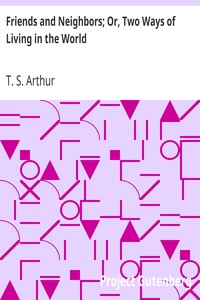Friends and Neighbors; Or, Two Ways of Living in the World by T. S. Arthur
"Friends and Neighbors; Or, Two Ways of Living in the World" by T.S. Arthur is a didactic work likely written in the mid-19th century. This text aims to explore moral and ethical dilemmas in human relationships, emphasizing the importance of kindness, charity, and the inherent goodness within people. The central theme appears to be the cultivation of harmonious relationships among friends and neighbors, promoting understanding and empathy over resentment and suspicion. At
the start of the book, the preface introduces the reader to the overarching idea that every individual has a spark of goodness, regardless of their situation or behavior. The opening chapter begins by discussing the concept of "Good in All," arguing against the tendency to label people as wholly bad based on their actions. Instead, the narrative encourages readers to seek out the good in every person, advocating for a compassionate approach towards those who struggle with vice or crime. Through vivid examples and philosophical musings, the text sets the stage for deeper reflections on human interactions, leading the reader towards realizing the vital role of charity, understanding, and forgiveness in everyday life. (This is an automatically generated summary.)
Read or download for free
| How to read | Url | Size | |||
|---|---|---|---|---|---|
| Read now! | https://www.gutenberg.org/ebooks/4593.html.images | 530 kB | |||
| EPUB3 (E-readers incl. Send-to-Kindle) | https://www.gutenberg.org/ebooks/4593.epub3.images | 277 kB | |||
| EPUB (older E-readers) | https://www.gutenberg.org/ebooks/4593.epub.images | 284 kB | |||
| EPUB (no images, older E-readers) | https://www.gutenberg.org/ebooks/4593.epub.noimages | 255 kB | |||
| Kindle | https://www.gutenberg.org/ebooks/4593.kf8.images | 577 kB | |||
| older Kindles | https://www.gutenberg.org/ebooks/4593.kindle.images | 546 kB | |||
| Plain Text UTF-8 | https://www.gutenberg.org/ebooks/4593.txt.utf-8 | 456 kB | |||
| Download HTML (zip) | https://www.gutenberg.org/cache/epub/4593/pg4593-h.zip | 271 kB | |||
| There may be more files related to this item. | |||||
Similar Books
About this eBook
| Editor | Arthur, T. S. (Timothy Shay), 1809-1885 |
|---|---|
| Title | Friends and Neighbors; Or, Two Ways of Living in the World |
| Contents | Friends and neighbours -- Good in all -- Human progress -- My washerwoman -- Forgive and forget -- Owe no man anything -- Returning good for evil -- Putting your hand in your neighbour's pocket -- Kind words -- Neighbours' quarrels -- Good we might do -- The town lot -- The sunbeam and the raindrop -- A plea for soft words -- Mr. Query's investigation -- Room in the world -- Words -- The thankless office -- Love -- "Every little helps" -- Little things -- Careless words -- How to be happy -- Charity: Its objects -- The vision of boats -- Regulation of the temper -- Manly gentleness -- Silent influence -- Antidote for melancholy -- The sorrows of a wealthy citizen -- "We've all our angel side" -- Blind James -- Dependence -- Two rides with the doctor -- Keep in step -- Johnny Cole -- The thief and his benefactor -- John and Margaret Greylston -- The world would be the better for it -- Two sides to a story -- Little kindnesses -- Leaving off contention before it be meddled with -- "All the day idle" -- the bushel of corn -- The account -- Contentment better than wealth -- Rainbows everywhere. |
| Credits | Produced by Charles Aldarondo, and David Widger |
| Reading Level | Reading ease score: 78.4 (7th grade). Fairly easy to read. |
| Language | English |
| LoC Class | PS: Language and Literatures: American and Canadian literature |
| Subject | Short stories |
| Subject | Conduct of life -- Fiction |
| Category | Text |
| EBook-No. | 4593 |
| Release Date | Oct 1, 2003 |
| Most Recently Updated | Jan 27, 2021 |
| Copyright Status | Public domain in the USA. |
| Downloads | 840 downloads in the last 30 days. |
| Project Gutenberg eBooks are always free! | |

